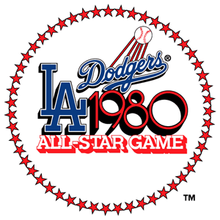 | ||||||||||||||||||||||||||||||||||||||||
| ||||||||||||||||||||||||||||||||||||||||
| Date | July 8, 1980 | |||||||||||||||||||||||||||||||||||||||
|---|---|---|---|---|---|---|---|---|---|---|---|---|---|---|---|---|---|---|---|---|---|---|---|---|---|---|---|---|---|---|---|---|---|---|---|---|---|---|---|---|
| Venue | Dodger Stadium | |||||||||||||||||||||||||||||||||||||||
| City | Los Angeles, California | |||||||||||||||||||||||||||||||||||||||
| Managers | ||||||||||||||||||||||||||||||||||||||||
| MVP | Ken Griffey (CIN) | |||||||||||||||||||||||||||||||||||||||
| Attendance | 56,088 | |||||||||||||||||||||||||||||||||||||||
| Television | ABC | |||||||||||||||||||||||||||||||||||||||
| TV announcers | Keith Jackson, Al Michaels, Howard Cosell and Don Drysdale | |||||||||||||||||||||||||||||||||||||||
| Radio | CBS | |||||||||||||||||||||||||||||||||||||||
| Radio announcers | Vin Scully and Brent Musburger | |||||||||||||||||||||||||||||||||||||||
The 1980 Major League Baseball All-Star Game was the 51st midseason exhibition between the all-stars of the American League (AL) and the National League (NL), the two leagues comprising Major League Baseball. The game was played on July 8, 1980, at Dodger Stadium in Los Angeles, California, home of the Los Angeles Dodgers of the National League. The game resulted in a 4–2 victory for the NL.
While this would mark the second time that the Dodgers had hosted the All-Star Game in Los Angeles, it was the first time that the game was being held at Dodger Stadium. Their first time as host in 1959 saw the game played at Los Angeles Memorial Coliseum; the Dodgers' Los Angeles home field until the construction of Dodger Stadium.
This All-Star Game would be known for some exemplary pitching performances, most notably AL starter Steve Stone's (three perfect innings, three strikeouts). Jerry Reuss struck out the side for the NL in the sixth, as well.
It would also be one of the final games for NL starter J. R. Richard. Richard was diagnosed with a career-ending stroke weeks later.
The pregame ceremonies of the All-Star Game featured Disney characters. Later, Edwards Air Force Base of Rosamond, California, provided both the colors presentation and, after the Los Angeles All-City Band performed the Canadian and U.S. National Anthems, the flyover ceremonies. This All-Star Game marked the first nationally televised US performance of O Canada after it had officially been designated the Canadian National Anthem seven days earlier on July 1, 1980. It also marked the debut of the modern-day large-scale video screen, with the first such video scoreboard, Diamond Vision by Mitsubishi Electric, being introduced at this game.
